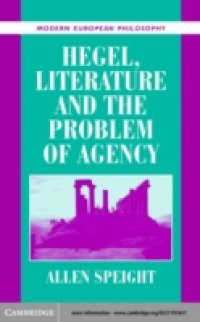Hegel's Phenomenology of Spirit has attracted much attention recently from philosophers, but none of the existing English-language books on the text addresses one of the most difficult questions the book raises: Why does the Phenomenology make such rich and provocative use of literary works and genres? Allen Speight's bold contribution to the debate on the work of Hegel argues that behind Hegel's extraordinary appeal to literature in the Phenomenology lies a philosophical project concerned with understanding human agency in the modern world. It shows that Hegel looked to three literary genres - tragedy, comedy, and the Romantic novel - as offering privileged access to three moments of human agency: retrospectivity, theatricality, and forgiveness. Taking full account of the authors whom Hegel himself refers to (Sophocles, Diderot, Schlegel, Jacobi), Allen Speight has written a book with a broad appeal to both philosophers and literary theorists.

